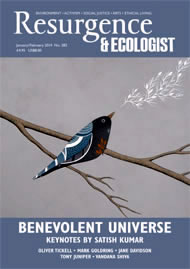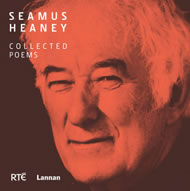Since the news of Seamus Heaney’s death at the end of last summer, I have been thinking about this remarkable man and wondering what his life and work represented. I found myself asking: what kind of mind did he possess? But each time the question arose, I realised that the formulation was not quite right. ‘Mind’ was far too confined a word for what I was seeking: too severed from the body, too removed from the busy traffic of the senses, too dualistic.
What I wanted to ask was more like: what kind of being was he? How, I wondered, did the poet meet the contingent world of immediate experience? The answer came back at once. He met it with an unfaltering sensuous intelligence. It was clear that Heaney had an exceptional capacity to ‘in-dwell’ so that things and events could find their voices through him. Such deep receptivity allowed the poet to become a witness, a seer, even a prophet. Not a fashionable idea, but one that has come down to us. In the Roman world they used the name vates – Ovid called himself the vates of Eros. The word carried religious and oracular associations. What Heaney represents for me is the power of embodied and revelatory thinking.
This quality comes out unobtrusively in Heaney’s Nobel lecture, in which he evoked his childhood on a small farm in County Derry. His recollections disclose a bright-eyed openness, an unselfconscious wondering. The memories carry in miniature the whole nature of the man and the aura of his work: “We took in everything that was going on, of course – rain in the trees, mice on the ceiling, a steam train rumbling along the railway line one field back from the house – but we took it in as if we were in a doze of hibernation.” He went on: “We were as susceptible and as impressionable as the drinking water that stood in a bucket in our scullery. Every time a passing train made the earth shake, the surface of that water would ripple delicately, concentrically, and in perfect silence”.
The water quietly receives, re-patterns and transforms the movements of the world outside: a metaphor for Heaney’s own kinaesthetic gift of taking in and converting. It is an illuminating example of Heidegger’s notion of ‘being-in-the-world’. We do not stand discrete; we are all in hyphenated relationships.The world is in us and we are in the world; an indivisible communion. The mundane and the mysterious come together and meet in the boy’s consciousness. The fact that it is clean drinking water only adds to the potency of the description.
In this early memory much of Heaney’s creative gift – what he later called (translating Virgil) the perception of “clear truths and mysteries inextricably intertwined”, can be discerned. The bucket of water marks his love of objects as they are, and as they resonate. It is no accident that one of his volumes is called Seeing Things, while other titles – The Spirit Level, The Haw Lantern, Electric Light – record objects as specific as the bucket standing in the scullery. In one poem a common country door latch is recreated: “Scissor-and-slap abruptness of a latch | its coldness to the thumb. Its seesaw lift | and drop and innocent harshness”. A fair clutch of poems are epiphanies to instruments or machines: sledgehammers, pitchforks, pumps, rakes, turnip-snedders, spades, anvils. Heaney delights in the encounter of bare hands and cast iron, the meeting of intention and instrument.
This sense of a dialogical connection between living things lies at the heart of Heaney’s sensuous intelligence. But in the Nobel lecture Heaney adds a further detail. It concerns an allegiance to the primordial urgencies of language. He describes how an aerial wire, attached to a chestnut tree outside the farm, brought the voices of the world into the remote farm. Once again, an inconspicuous object – a mere wire – is linked to something large and encompassing: the conversation of humanity. The small radio lets in the cosmos of language: the BBC world news, the words of Dick Barton and Biggles, and, at a turn of the dial, the names of foreign stations – Oslo, Stuttgart, Warsaw – and with them what Heaney calls “the gutturals and sibilants of European speech”. And this is another vital element of Heaney’s sensuous intelligence: an almost physical engagement with words, their music, their resonance, their meanings and ambiguities. It is an engagement that enables objective things to leapfrog into a subjective dimension of space and time, becoming symbolic revelations feeding the imagination, unlocking the universe.
Of course, it was not only the language brought into the farm by the BBC: it was also an acute awareness of the immediate vernacular that surrounded him. It was the spiky staccato rhythms of local speech as well as the lexicon of Catholicism – his mother reciting the litany to the Blessed Virgin, the categorical tone of the red catechism, the mellifluous music of the Latin Mass.
In Heaney’s late adolescence, it then became the voice of poetry: Chaucer, Shakespeare, Keats, Wilfred Owen, Yeats; but most of all the priest-poet Gerard Manley Hopkins. In his early essays, Heaney talks very directly about his apprenticeship as a poet, the systematic education of his guttural muse. Hopkins became his first exemplar, partly because his vision was Catholic and partly because his manner of speech was thick with alliterative consonants close to the idiom of his own rural background. Heaney’s method always lay in being, at first, hugely receptive. He never rejects; he incorporates to transform.
Some of the juvenilia point to the laboured emulation. One discarded phrase reads: “trickling trinkle of bells well in the fold”. The older Heaney smiles at his desperate imitation, yet it reveals the matrix from which much of the early lyrical work was to emerge. It prefigures such robust lines from Blackberry Picking where the fruit was “sweet | like thickened wine; summer’s blood was in it | leaving stains upon the tongue and lust for | picking”. In Death of a Naturalist and Door into the Dark the poems exhilarate with their linguistic precision and their musical resonance. The meditative experience had found its expressive form; the artifice had become art.
But there was a third force shaping Heaney’s sensuous intelligence. In an early essay he called it “tradition”. The personal experience and the mastery of technique had to be taken down into the collective past, to be rooted in the loam of history. In The Prelude, Wordsworth had written that the poet’s task was that of enshrining “the spirit of the past for future exploration”. Heaney felt these words recorded a cultural truth and issued an ethical command. The famous pen he digs with is, of course, not only a reference to his father and the hard labour of farm-workers: it is often an archaeological image of going down to discover what lies beneath. The water-diviner offers a similar image of penetrating the surface to locate subterranean resources for living. The poet as digger, as diviner, as diver.
The many translations of earlier work, from Sophocles, Virgil and Dante to Beowulf are part of this excavation but so, more dramatically, is the discovery of the gods and goddesses under the ancient peat bogs of Ireland, and the fierce life suggested by the scattered bones and golden relics of Romano-Celtic Britain. And here Heaney was able to forge terrifying (and illuminating) connections between the ancient world and the atrocities that surrounded him on all sides. The final stanza of the poem North embodies some of the more positive wisdom he had learnt: “Keep your eye clear | as the bleb of the icicle | trust the feel of what nubbed treasure | our hands have known”. Tradition, indeed, is too staid a word for such open-eyed excavation, such tough renewal of life, the piercing of the word-hoard buried in the furled brain and the furrowed earth.
If we draw together the complementary concepts of intuitive experience, language and craft, ‘tradition’ and renewal, we have a cogent diagram of Heaney’s understanding: a poetics of objects and relationships, of observations and transformations. This is what his life represented and what his writing embodied. It would seem fitting to suggest that Heaney was a conservationist poet par excellence, an ecological poet of the first order.
In Greek oikos denotes ‘house’ or ‘dwelling’, while logos refers to ‘word’ or ‘speech’. The greatness of Heaney is that his poems speak eloquently of ‘our-being-here’ in the house of life; they enhance our sense of belonging – truths and mysteries inextricably intertwined.







